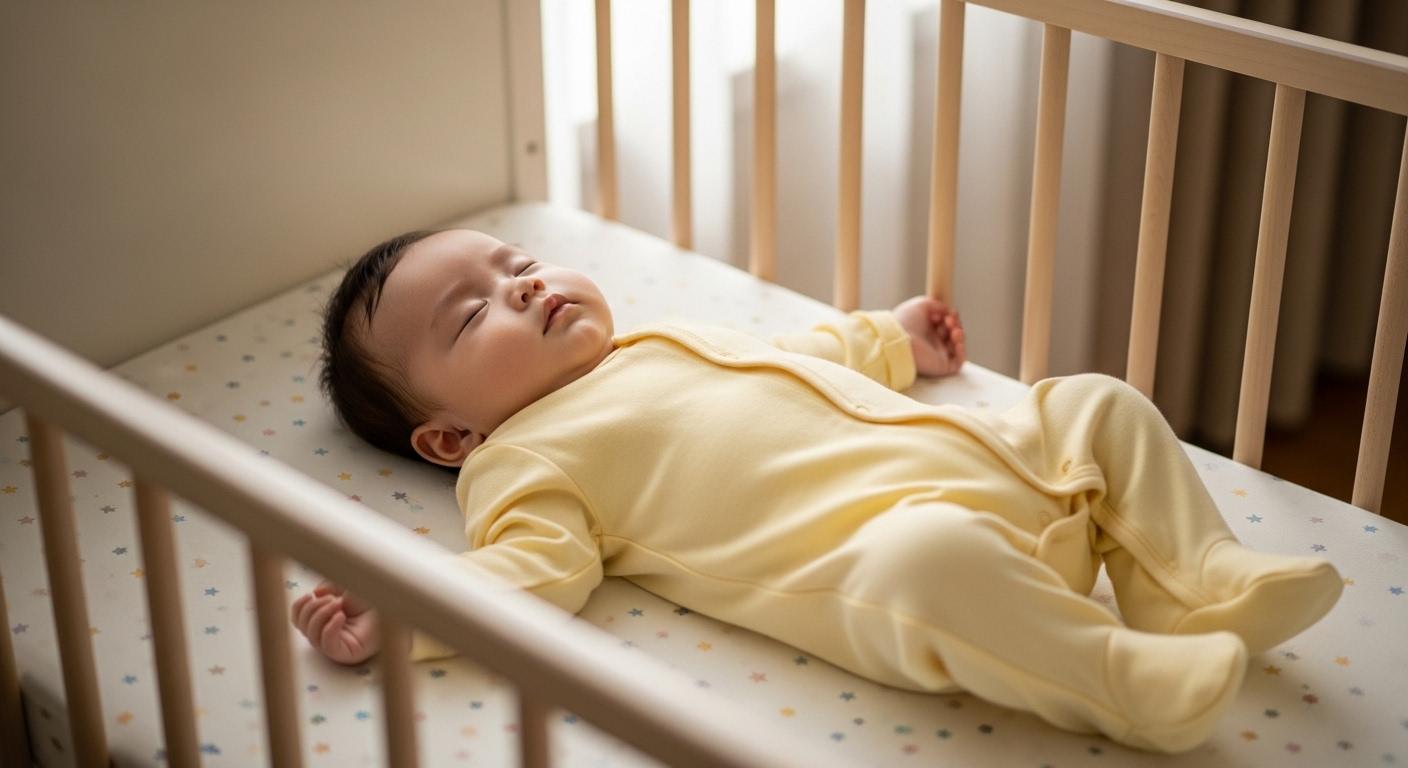Adapted from educational materials by The Sleep Sense™ , with expert input from Dr. Jodi Mindell and reference to Tom Vaillant’s article in The Pudding (July 2024).
As a sleep consultant, one of the most common questions I hear from parents is:
“Will sleep training harm my baby’s brain or affect our bond?”
These fears are completely understandable, especially with so many conflicting opinions online. But when we take a closer look at what research actually says, the story is very different from what some parenting blogs and forums suggest.
Here’s what the science and decades of studies really show about the most common sleep training myths.

Myth #1: Sleep Training Causes Brain Damage or “Toxic Stress”
Origin of the Myth
This idea traces back to Dr. William Sears, founder of attachment parenting. He warned that letting babies cry can raise cortisol and affect brain development.
However, Dr. Sears often cited the work of Dr. Joan Kaufman, whose studies actually examined extreme cases of neglect and abuse — such as children raised in orphanages — not babies in loving homes going through short, structured periods of crying during sleep training.
Similarly, Dr. Darcia Narvaez’s 2011 article in Psychology Today linked crying to trauma, but her claims were based on animal studies, not actual research on sleep training.
What the Research Really Shows
Multiple high-quality studies have found no evidence that responsive sleep training harms the brain or causes toxic stress.
Gradisar et al. (2016) followed 43 infants aged 6–16 months who were randomly assigned to graduated extinction, bedtime fading, or a control group.
→ Results: lower cortisol levels, improved sleep, and no negative impact on emotional or attachment outcomes at 12 months.
(Sources: The Pudding, ERIC, RespectfulParent.com)Price et al. (2012) tracked 225+ children to age six and found no differences in behavior, emotional well-being, or parent–child closeness between those who were sleep trained and those who weren’t.
(Sources: PubMed, AAP Publications, Reuters)
Dr. Kaufman herself later clarified:
“Our paper is not referring to routine, brief stressful experiences, but to abuse and neglect. It is a mis-citation of our work to support a non-scientifically justified idea.”
So, to be clear — short, structured crying during responsive sleep training is not the same as chronic stress or trauma.
Myth #2: Sleep Training Damages Attachment or Trust
Origin of the Myth
Dr. Sears also argued that “ignoring” a baby’s cries could teach them that no one will come — potentially eroding trust.
Later, Dr. Narvaez suggested that this might even affect mental health later in life.
But these claims are not based on actual sleep training studies. They are extrapolations — ideas drawn from unrelated research.
What the Research Really Shows
Attachment is built through thousands of daily moments of connection — not one specific bedtime method.
The largest long-term randomised trial (Price et al., 2012) followed 326 infants for five years and found no differences in attachment, stress, or behavior between sleep-trained and non-sleep-trained children.
In my experience working with parents here in Singapore, I have seen that when babies sleep better, parents become more emotionally available and patient during the day. That actually strengthens the parent–child bond.
Myth #3: Sleep Training Means “Cry It Out”
Origin of the Myth
The term “sleep training” is often misunderstood as harsh “cry it out,” where parents leave babies to cry alone with no comfort.
But that is not what evidence-based sleep training looks like.
What the Research Really Shows
There are many responsive approaches to sleep training, including:
Graduated extinction (controlled comforting)
Bedtime fading
Pick up, put down
Camp-out or chair method
These methods all allow parents to stay connected and responsive while giving babies the space to develop self-soothing skills.
Studies show these approaches are safe, effective, and developmentally appropriate, and they often lead to less crying overall as babies learn to settle independently.
(Sources: The Baby Sleep Haven, The Pudding)
Key Takeaways
✅ Short, structured crying during responsive sleep training is not neglect.
✅ There is no scientific evidence that sleep training harms a baby’s brain or attachment.
✅ Research-backed methods like graduated extinction and bedtime fading improve sleep without harm.
✅ Well-rested babies and parents tend to be calmer, happier, and more connected.
As Dr. Kaufman rightly pointed out:
“Using our research to argue against sleep training is scientifically unjustified.”
Final Thoughts
As both a mum and a certified sleep consultant, I understand the emotional weight behind these decisions. Sleep training can sound intimidating, especially when you love your baby so deeply and just want to do what is best.
But when done thoughtfully, with comfort, responsiveness, and consistency, sleep training is an act of love. It helps your baby get the rest they need for healthy growth and helps you regain the calm and patience to enjoy motherhood again.
Because when everyone sleeps better, everyone thrives.
If you have been struggling with your baby’s sleep and aren’t sure where to start, I would love to help. Book a free 20-minute discovery call and let’s talk about a personalised sleep plan for your little one.